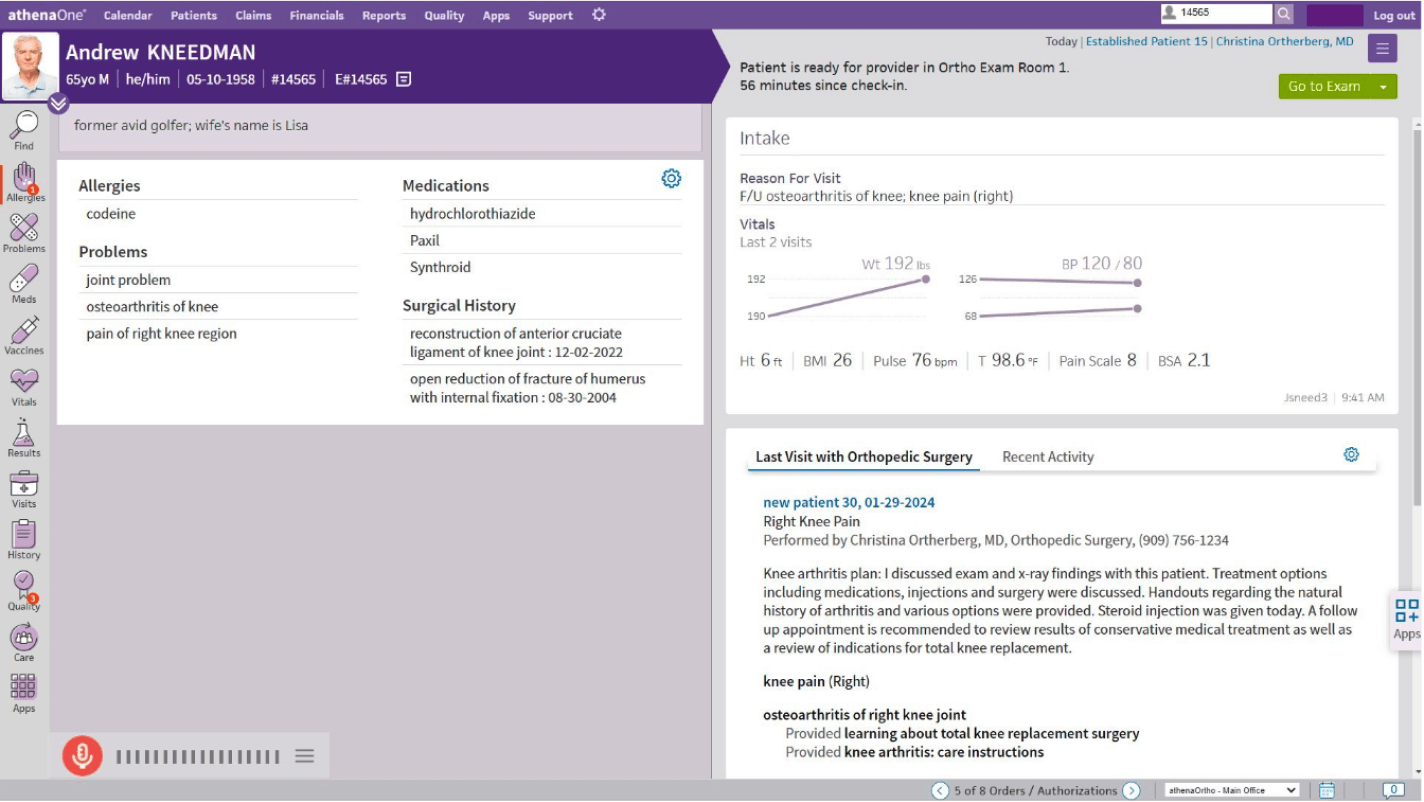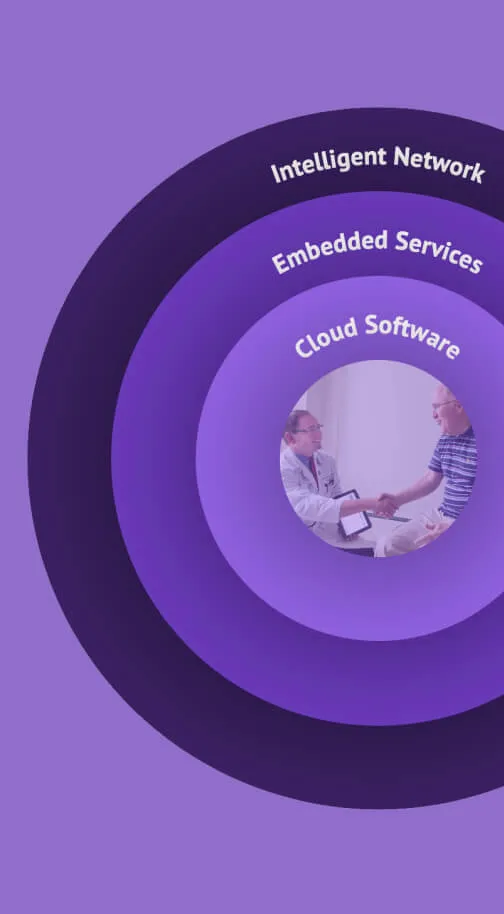Gain a competitive edge, increase revenue, and improve patient experiences with athenaOne EHR software
The US orthopedics market is fast-growing, on the rebound in the wake of the COVID-19 pandemic and rising to meet the needs of an aging population. The market is expected to reach a size of nearly $50 billion by 2028, and private equity is energetic about investing in orthopedics practices and the busy ambulatory surgery centers (ASCs) that are now commonly used for patient procedures.1
There are plenty of opportunities, but there are also challenges to working in this specialty.
For one, it's highly competitive. Patients have options, so factors like appointment availability, prompt scheduling, and easy-to-use patient apps offer real advantages to practices working to keep their schedules full.
Also, as orthopedic providers like you know, the day-to-day work needed to keep a clinic busy and running smoothly can be overwhelming. On the clinical side, EHR workflows are often overbuilt or simply don’t complement the typical flow of orthopedic patient visits. Consolidating and accessing the right information at the right time is also challenging. Since many of your patients are referred by primary care or urgent care providers, their historic health data might not be in your EHR system. Ordering imaging and durable medical equipment (DME) can be complex since it may be managed in-house, via outside vendors, or both. You’re also probably on the move; orthopedic surgeons often travel between multiple care settings—like a home clinic and an ambulatory surgery center (ASC) or hospital—throughout the week, which can further complicate health data consolidation.
These factors, along with more pervasive challenges around billing and revenue cycle management, are taking a toll. Simply keeping up with documentation often requires physicians to take their work home. According to a 2023 Medscape survey, orthopedists spend 13.7 hours a week on paperwork and administration.2 These bureaucratic tasks are time consuming and tedious, and 60% of orthopedists say this kind of work tops the list of contributors to burnout.3
There are a variety of Healthcare IT and services providers who claim to offer an orthopedics EHR that addresses the specific needs of orthopedists and alleviates the burdens that hamper productivity and jam up the revenue cycle. Even so, the wrong EHR software can quickly become its own barrier to providing excellent care and running a productive, successful practice.
Let's take a closer look at some of the day-to-day challenges orthopedic practices and providers face, and what role healthcare technology can play in solving them.
Top challenges for orthopedic practices today
- Highly competitive specialty: You want to be the best at what you do. That doesn't only mean being the best orthopedic surgeon in your area, it also means staying a step ahead of your peers in terms of patient experiences and operational efficiency. Patients want to be seen soon, scheduled for procedures quickly, and also have access to a web portal and mobile app that gives them easy access to health information and a direct line of communication with their care team.
- Reimbursements are in decline: Reimbursements from both Medicare and private insurance have been in decline, particularly among orthopedists. These lower payments paired with inflation have created a difficult financial situation for many practices. Orthopedic clinics need to maximize reimbursements by submitting clean and accurate claims as quickly as possible. Providers also need to keep their schedules dense in order to fill their available appointments for visits and procedures to strengthen revenue.
- Documenting high volumes of appointments is time-consuming: Documenting patient encounters must be done quickly, thoroughly, and accurately. High patient volumes in orthopedic clinics mean that documentation work piles up and must often be completed outside “in-office” hours. Capturing this information must be done in a way that is intuitive and supports an efficient and focused encounter with your patient.
- Authorizations and other billing tasks are complicated: High patient volumes mean authorizations are a key operational bottleneck. Making matters worse, you're likely seeking some reimbursements outside traditional payers (e.g., worker's compensation, vehicular accidents, legal claims, etc.), which adds complexity. Simply hiring additional staff to perform the work isn’t scalable, and finding qualified professionals is increasingly difficult.
- Value-based payment models are helpful, but unfamiliar: Quality programs like MIPS offer great financial benefits to orthopedic practices. Even so, ensuring compliance with program requirements and getting visibility into program enrollments is both necessary and time-consuming.
The solution: finding an EHR system that helps your orthopedic practice thrive
Do the challenges outlined above sound familiar? If so, you’re not alone. Thankfully, many clinical and administrative challenges that slow down your work can be addressed with the right healthcare IT platform.
Let’s look at some of the ways this kind of technology can empower you and your practice to thrive.
- Utilize tailored, orthopedics-specific workflows: Use a medical EHR that comes pre-built, and can be configured, to help you move through your most-common patient encounters efficiently, with minimal disruption.
- Streamline authorizations and reimbursements: Use a practice management and revenue cycle management software that helps streamline authorizations and enables you to keep your schedule full and procedure wait-times short.
- Accelerate documentation: Utilize time-saving tools like templates, text macros, voice-to-text dictation, mobile capabilities, and other innovations to make documentation faster and more accurate.
- Leverage expertise in orthopedics workflows and alternative payment models: Partner with a platform and services provider that knows how orthopedists work and can help you get what you need most from your technology tools. This partner should also provide timely guidance on evolving requirements for case-based payers like workers’ compensation and legal, as well as quality programs like MIPS, to help you maintain compliance.
Top benefits of athenaOne for Orthopedics
athenaOne for Orthopedics is a comprehensive EHR, RCM, practice management, and patient engagement solution designed specifically for orthopedic practices. Our platform provides an all-in-one cloud-based solution tailored for your day-to-day needs. It creates a more engaging experience for your patients and streamlines your clinic operations, working to simplify care delivery, reduce administrative burdens, and support revenue cycle success.
As an athenaOne customer, you’ll also gain valuable insights from over 150K providers on the network, including 6,700+ orthopedic providers.4 With athenaOne for Orthopedics, you get the full suite of capabilities from the core athenaOne solution, plus:
- Orthopedic-specific workflows available on both mobile and desktop
- Streamlined billing workflows and reporting tools to help you get paid faster in a complex reimbursement landscape
- Highly skilled onboarding and customer success teams with expertise in orthopedic practices
- An innovative, orthopedic-centric roadmap of new features, including Ambient Notes, expanded support for ASCs, orthopedic-specific mobile workflows available on iPad, and more
Here are some of the benefits you can expect from using athenaOne for Orthopedics:
- Drive clinical and operational efficiency across care settings: Work efficiently and seamlessly with an intuitive, user-friendly EHR and mobile tools that keep you and other care providers connected, and reduce the burden of administrative tasks like authorizations so staff can focus on patient care.
- Deliver excellent experiences that drive patient engagement and satisfaction: Impress and empower patients with the kinds of digital tools they’ve come to expect. Our patient engagement tools will help you drive schedule density and reduce no-shows.
- Maximize reimbursements: Navigate the complex payer landscape with help from athenaOne experts. Become more efficient and successful in seeking reimbursements for complex claims for workers compensation and personal injury cases, and leverage opportunities in both fee-for-service and value-based care models.

Providers get orthopedics-focused tools and workflows using athenaOne for Orthopedics
1. Intuitive, efficient visit and documentation
Tailorable web, mobile, and voice-driven documentation tools improve efficiency for busy clinic days and enable you to focus on what matters most. Orthopedic-specific documentation accelerators like text macros and a library of easily customizable clinical content also save you time and attention during the documentation process, enabling you to spend less time in the EHR and more time seeing patients.
2. Collective knowledge that drives results
Our proprietary rules engine—fueled by its 30,000+ rules5 —leverages the power of our provider network, payer knowledge, and billing experts to automatically scrub claims, helping you avoid costly claim errors and denials, and accelerating your reimbursements. This collective knowledge and expertise is embedded in the solution and will help ensure you get paid more quickly and completely.
3. Insightful reporting and benchmarking
There is important knowledge in your data, you just need to uncover it. Our reporting tools deliver actionable and empowering insights to enable you to make data-driven decisions that drive strategic growth and help you reach your goals.
4. Authorizations made easy
Our continuously updated authorization determination engine and team of specialists work in concert to solve the authorization management challenge and obtain required authorizations in a timely manner. More than 7.4 million orders6 for authorizations were processed through athenaOne in 2023, with over 98% processed without the need for further intervention.7
* Authorization Management is included in our extended revenue cycle management services packages
5. athenaOne voice solutions
Integrated desktop and mobile dictation and voice assistant tools—including our ambient documentation tool, Ambient Notes—enable you to complete encounter documentation and other clinical tasks hands-free. This means you can maintain your mobility and focus on treating your patients while ensuring accurate and efficient documentation.
* Voice Solutions is sold as an add on
athenaOne for Orthopedics is an innovative solution that allows providers and practices to operate with agility. We empower orthopedists to deliver the most personalized, precise, and coordinated care— while running a successful and profitable practice.
If you are looking for an easy-to-use platform with all-in-one-capabilities for electronic health records, practice management, revenue cycle management, and patient engagement, learn more about athenaOne for Orthopedics.
- Stratview Research. Orthopedic Market Size, Share, Trend, Forecast, Competitive Analysis, and Growth Opportunity: 2022-2028.
- Medscape, May 2023, Orthopedist Compensation Report 2023, pg 16; https://www.medscape.com/slideshow/2023-compensation-orthopedist-6016369#16; IS163
- Medscape, May 2023, Orthopedist Compensation Report 2023, pg 16; https://www.medscape.com/slideshow/2023-compensation-orthopedist-6016369#16; IS166
- Based on athenahealth data as of Jun 2024; M109
- Based on athenahealth data as of Mar. 2024; M017
- Based on athenahealth data as of Dec. 2023; M160
- Based on athenahealth data as of Dec. 2023; M161













